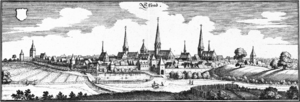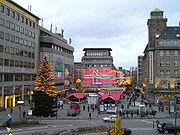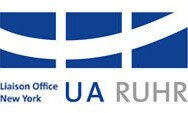
This page is currently under construction.... more info will be added soon!
It started with a river, over 1000 years ago….
What makes the Ruhr area one of the most unique areas in Germany began more than 1,000 years ago. Many small towns and villages were located along the Ruhr river and what was called the ‘Hellweg’, an old merchant’s route that ran from the center of Germany all the way to the Dutch border. Both the river and the Hellweg were a bustling 'highway' and waterway for trade. The footprints of thousands of Merchants carved out the roads, and as more and more people settled, villages in the Ruhr area began to grow.
A city founded by Women & Princesses....
 - For over 400 years the main city in the Ruhr area, Essen, was presided over by a monestary of women, called the Essen Abbey. The Essen Abbey was a collegiate foundation, or canonry, for the daughters and widows of Germany's nobility.
Middle Ages: The Ruhr area grows into a European commerce center...
 
During the middle ages, several Ruhr-area cities joined the ‘Hanseatic’ league, an old medieval German trade association. Gradually the Ruhr area became a pulsepoint for European business and invention.The sounds of hustle-and-bustle filled the air. Then, with trade already flourishing, a life-changing discovery was made.......
Eureka! The ground is rich with coal....

Under the surface of the entire Ruhr area are dark, fertile fields of coal. The first coal mine was opened by the women of the Monestary in the mid 1300's. Besides being a center for commerce, the Ruhr area soon became Germany's energy capital, the world's center for coal mining and steel production. New factories and steel mills sprouted across the land, including what some considered to be 'the world's prettiest steel mills', but the skies grew dark with smoke. For over two hundred years, the Ruhr area was the heart of the German coal and steel industry.
Factory workers pour in from around the world: The first melting-pot of cultures develops...
 
With workers pouring in from across all of Europe, something else happened: a unique gathering of people unlike any where else in the world. Tolerance and direct communication became vital. Due to the hazardous conditions underground in the coal mines, the workers had to be able to totally rely on one another. Commands and communication had to be straight forward, quick and precise – features you will still find in people from the Ruhr area. The typical “Ruhrgebietler” (person from the Ruhr area) has a very honest, genuine and down to earth character. You can hear it in how people talk, and see it in how people behave. Family, friends, commraderie, directness, and honesty define the area
The economy changes: What should we do with all these old factories?
When the steel and coal era came to an end in the mid 20th century, it was mainly the people’s open-mindedness and unique outlook that turned the Ruhr area from a stronghold of the coal mining and steel production industry into what it is now: a leading figure in the fields of technology, business, education and culture.
A Fresh perspective: Old Factories turn into Galleries, discotheques, classrooms, concert halls
In the wake of this new era of technology and service, the Ruhr area was left with the lingering questions “What should we do with all these old buildings and factories?” This is when the Ruhr-area leaders did something unexpected: Instead of tearing things down, they built them up and ‘flipped them over’. Old coal mines were turned into discotheques and swimming pools, ice skating rings were added to an anthracite factory, fields were reforested, light shows were added onto the refinery tanks, and a new culture was born in one of Germany’s most diverse areas. Once the center of people’s everyday existence, the industrial sites now offer numerous cultural events and unique entertainment opportunities which people from outside the Ruhr area have never experienced before.
Europe's Capital of Culture 2010
 
 
 
|

















